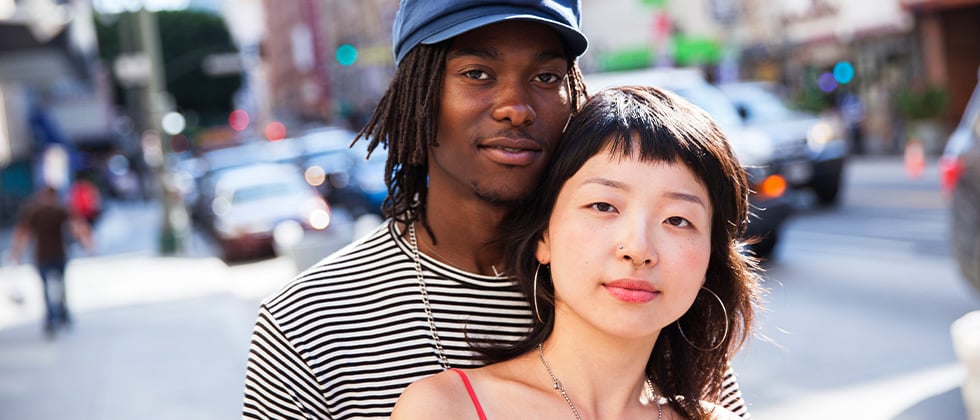
How to be More Confident in Your Romantic Efforts
Self-confidence can be difficult to manufacture in social situations these days. With all the crowds and bluster that focus on “being the center of attention” a lot of emphasis has been put on how to be more confident and use it as some kind of social leverage.
But let’s focus on healthy and constructive ways like how to be more confident in yourself so you can authentically enrich your interactions with colleagues, friends, social circles and, hopefully, your romantic interactions too.
The concept of confidence
There is a distinct difference between confidence and self-esteem in that confidence is a mode of expression. Self-confidence is how we communicate our self-esteem to others, which is why it can often feel like a disparate concept.
One of eharmony’s relationship experts Laurel House says: “True confidence comes from a deep knowing, owning, and showing up without fear or insecurity, as your unapologetically vulnerable self. It is the convergence and alignment of your attitude, actions, and words. Interestingly, it’s possible to have compartmentalized confidence, existing only in specific categories of your life, for example in business, sports, family, or dating. The goal is to have baseline confidence that carries through all areas of your life.”
When looking at how to be more confident, it isn’t an exclusively superficial concept. Quite the opposite actually. Expressing one’s assurance in one’s self-worth leads to significant changes in our self-esteem and can also lead to more healthy relationships. A study from the British Psychological Society found we enjoy being our best selves in relationships as opposed to our true selves (an often-misguided self-representation)1.

The role of self-awareness in how to be more confident
A more antiquated view of how to be more confident in a relationship would probably tell you to come up with a somewhat overestimated view of yourself.
But self-confidence is most psychologically beneficial when grounded in reality. It’s about outing and appreciating the aspects of you that make you special as well as the weaknesses that hold you back.
Here are some exercises to build up your self-awareness:
- Breathing exercises – Take a few minutes each day to focus solely on your breathing. Note the rhythms and your emotions. This is practice similar to meditation.
- Ask yourself the hard questions – Self-knowledge is the key to how to be more confident. Enquire upon yourself probing questions. What are your beliefs and values?
- Get an outside perspective – Ask someone you trust like a friend or family member for an honest assessment of your strengths and weaknesses.
- Self-compassion – A non-judgmental attitude towards yourself is crucial to self-awareness.
- Active listening – Be mindful and engaged when you talk to other people. Try focusing on how well you understand other people’s situations and the way you react to them.
How self-limiting belief structures affect how to be more confident as a man or a woman
Let’s take a deeper look at how we tend to often use a self-limiting belief system and poor self-esteem in our lives to not just undermine our romantic efforts but our ability to achieve intimacy in general, and how you can positively deal with it.
- Hone in on negative thought patterns – Take some time to reflect on and identify the negative recursive negative thought loops.
- Focus on communication – Share what you’re thinking with your friends and family to help cultivate empathy and identification.
- Take stock of how you see yourself – Negative self-talk is such an easy way to excuse our failures but it’s a major impediment when learning how to be more confident. Try to replace toxic internal dialogues with positive, affirming ones.
- Practice self-love – Acne and all, be kind to yourself and embrace your imperfections.
- Acknowledge your improvements – While self-honesty is important, equally vital is keeping a score of the positive changes in yourself.
- Consider professional guidance – Sometimes professional help is the only way to address deep-seated complexes and self-limiting beliefs and develop healthier perspectives
How to be more confident as a woman or a man
An eharmony relationship expert Laurel House: “Overall confidence can come from being fully yourself. Certainty is the most attractive and attracting trait that creates magnetism and makes others actually have confidence and trust in you, which then allows you to feel even more confidence in yourself. Certainty is a knowing — knowing who you are, what you believe, and what you bring to the table. In order to come to this place of certainty, it’s important to take some time to be honest with yourself about what is great about you and who you are as a person. Define your core values, and show up without showing off.”
To grapple with those core beliefs while boosting your confidence, take an inventory of self-limiting thought patterns. Dialogue with friends and people you trust to gain fresh perspectives on your strengths and realistic paths for how to be more confident in yourself.
And don’t forget self-compassion. When trying to figure out how to be more confident, take a step out of your usual self-affirming narrative and start establishing attainable goals and properly acknowledging your progress.
Here are some effective techniques for setting healthy life goals:
- Create SMART Goals – This stands for: Specific, Measurable, Achievable, Relevant, and Time-bound. It’s essential that your goals are grounded realistically in your life and capacity.
- Make them manageable – Parse out larger goals into smaller, manageable tasks. Not only does it give you a more optimistic outlook for success, but you also can celebrate tiny victories.
- Put your goals on paper – Give voice to your goals to improve your overall level of commitment and accountability in learning how to be more confident.
- Make your goals your central focus – It’s important to first prioritize essential goals to avoid overwhelming yourself.
Here are some specific tips for achieving this.
Tip 1: Develop a growth mindset
When looking at how to be more confident, it essentially devolves down to the notion of a growth mindset versus a fixed one.
Fixed mindsets hinge on a belief that abilities and intelligence are ingrained. A growth mindset perceives ability and intelligence as ever-shifting, naturally embracing challenges. People with a growth mindset tend to be more persistent and open to experiences.
Here’s how to cultivate a better mindset.
- Embrace challenges as opportunities for growth.
- Look at your deficiencies as future opportunities.
- Rather than saying, “I can’t.” rather say “I haven’t yet.”
- Celebrate your milestones. No achievement is too small to celebrate
- Cut toxic people who bring you down out of your life
- Failure is inevitable and a healthy growing experience. Stay on it and be resilient.
At the end of the day, it’s crucial you focus on the journey of building yourself up, not just the destination.
Tip 2: Improve your confidence and your body language
When trying to figure out how to be more confident, we often miss that how we see ourselves is the image we project to the world. A Cornell University study expert found that “People’s capacity to evaluate themselves and predict their behavior is usually quite modest and often much more meager than common intuition would lead one to believe.”2
We pathologically underestimate ourselves. Here are some behaviors that are passively self-affirming.
- Show yourself appreciation every day. Spend 5 minutes in the morning reflecting on your distinct skills and competencies.
- Engage confidently in your body language. This includes maintaining eye contact, a good posture, and mirroring their body language to indicate congruency so you properly engage with what they’re saying.
- Make sure you have open body language. Don’t cross your arms or put yourself at an indirect angle.
Tip 3: Practice self-compassion
Turning this compassion inward is vital. You need a good relationship with yourself before you can build a healthy one with others.
Giving love and nurture to yourself improves your inner strength, so you’re more ready to take risks, learn from your failures, and invite personal growth
Here’s how to be more confident in a relationship through self-care.
- Practice mindfulness when communicating with your partner. Try to stay present and be aware of negative thought patterns.
- We tend to be harsher on ourselves than others. Instead, treat yourself with compassion and understanding.
- Give more attention to the wins in your life than the losses. It will always be a mixed bag.
- Learn to not only love your weaknesses but also embrace them as essential aspects of you
- Forgive yourself for mistakes. They don’t define you.

How to be more confident in your dating life
We often hinge our viability as a strong dating prospect on a litany of things: our looks, our position in life, how much money we earn and even completely irrelevant notions like our height. The truth is people who are confident tend to have more successful dating experiences. A study at the University of North Carolina found self-worth and dating experience have a profound effect on selection theory, a central notion of sexual relationships3 .
What often holds us back is that eternal fear of rejection and what it’s supposed to suggest of us as human beings. But not only should you embrace rejection as part of the process but also let it add to your thesis of how to be more confident as a woman or a man through the process of trial and error.
Let’s look at some basic tips for creating a good foundation.
- Try to reframe rejection as a learning opportunity as well as celebrate putting yourself out there.
- Face your fear rather than hide from them. The more you face an issue, the less frightening the concept becomes.
- Cultivate resilience by not being too hard on yourself but rather practicing self-care and leaning on your support system.
How to be more confident when looking at possible dating opportunities
Jumping into the dating pool can be a bracing experience. While dating can be a lot of fun, the practical experience can be a bit jarring. What do you talk about? Are you talking too much or too little? What’s the appropriate level of intimacy? Overthinking it can sometimes leave you feeling like you’re stuck on a high wire.
- Come to terms with your fears – you can’t deal with your fear of rejection without knowing what’s driving it. You may have low self-esteem, a reluctance to accept new romances, self-sabotaging tendencies or any one of the dozens of mental hang-ups that get in the way of intimacy.
- Set realistic expectations for dates – Not everything is going to be perfect, and setbacks, misunderstandings and baggage are a natural part of the process. It’s a date and just the first step in a long journey together.
- Don’t hide your vulnerabilities – We want to exude strength and confidence during initial interactions. But what actually fosters quicker and deeper connections is your willingness to also showcase your weakness and the quirks that make you up.
- Be present – Being in the moment inspires confidence because it stops you from getting in your head about the interaction and negative ideation.
How to be more confident in an active relationship
Confidence is crucial in a growing romantic relationship because this confidence is your statement of personal value. Self-esteem and confidence are strongly linked to our perceived level of attractiveness4 but this can often be misguided as our looks are only part of the value we bring to relationships along with our personality, dependability, sense of kindness, humor, empathy and a myriad of other qualities that serve to deepen our relationships.
Self-confidence also helps create healthier relationships as it increases the level of trust between partners and stops it from being hampered by insecurity, how openly and effectively they communicate – expressing vulnerabilities, needs and boundaries more clearly – and set the tone for more constructive relationship dynamics that are based on mutual respect and a higher sense of self-assurance.
One of eharmony’s relationship experts Laurel House: “Within a relationship, confidence comes from the 3Cs: Communication creates Clarity, which creates Confidence. Communication is one of the most foundational components of a relationship. And it goes beyond telling stories, feelings, and sharing your days. Communication creates clarity. In communicating your stories, your feelings and your needs, and following up those stories with questions, you are able to extract and reveal information and insight to your partner. That clarity as to who they and you are, and what you feel and need, creates confidence in your relationship. That communication-created confidence in the relationship allows you to feel safe, seen, and sexy. And those 3 Ss are the makings of an enduring relationship.”
So when you’re looking at how to be more confident in yourself, try to remember that while it may be tied to ego and perhaps even a certain unrealistic notion of ourselves, it’s also a vital social tool that helps attract others to you and be confident in the value you offer others, which makes them happier and fosters a positive and constructive self-image.
It’s all about valuing yourself
It’s easy to see that when looking at how to be more confident, it’s about more than specific interactions but more about how we internally engage with our thoughts and emotions as well as our willingness to put ourselves out there regardless of our fears and hangups.
But it’s important to take small steps. Try confidence-building exercises and then slowly start to move further out of your comfort zone by initiating random interactions, expanding your horizons and being open to engaging with strangers.
Your search for a great relationship has never been easier with groundbreaking overhaul of the eharmony you know and trust.
Sources
The Cut:”Being Your True Self in a Relationship Is Less Important Than Being Your Best Self” ↩
Cornell University: “Having Inaccurate Self-Insights Has Serious Consequences” ↩
Journal of Marriage and Family: “Self-Esteem and College Dating Experience as Factors in Mate Selection and Marital Happiness: A Longitudinal Study” ↩
Evolutionary Psychology: “Self-Perceived Attractiveness, Romantic Desirability and Self-Esteem: A Mating Sociometer Perspective” ↩








